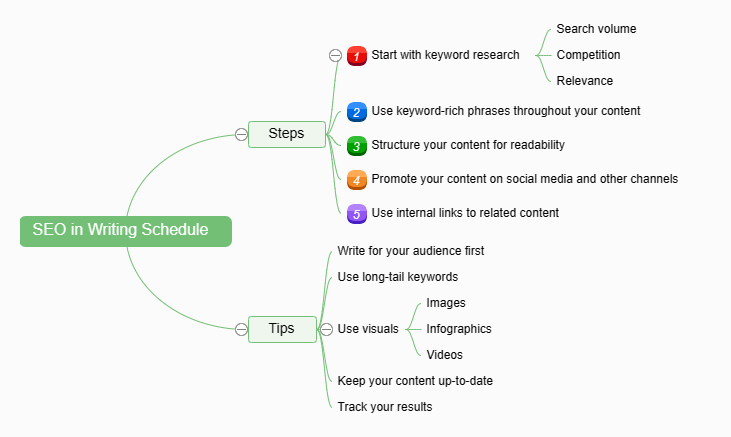How to Implement SEO in Your Writing Schedule
Don't miss out on valuable website traffic! Find out how to seamlessly integrate SEO into your writing schedule and watch your rankings soar.
AI WRITING TIPS AND TRICKS
8/26/20232 min read


Start with keyword research. Identify the keywords that your target audience is searching for, and use them throughout your content. When choosing keywords, consider the following factors:
Search volume: How often are people searching for these keywords?
Competition: How many other websites are ranking for these keywords?
Relevance: Are these keywords relevant to your content?
Optimize your title tags and meta descriptions. Your title tags and meta descriptions are the first things that people will see when they search for your content on Google. Make sure to include your target keywords in these areas, and make sure that your titles and descriptions are clear and concise.
Use keyword-rich phrases throughout your content. Don't just stuff your content with keywords. Instead, use keyword-rich phrases that are relevant to your topic. This will help Google understand what your content is about and rank it more favorably.
Structure your content for readability. Use clear and concise sentences, and break up your content with headings, subheadings, and images. This will make your content easier to read and understand, and it will also help Google crawl and index your content more easily.
Promote your content on social media and other channels. Once you've published your content, promote it on social media and other channels to get more people to see it. This will help you attract more traffic to your website and improve your SEO rankings.
Use internal links to related content. Internal links help Google understand the structure of your website. And it indicates the relationship between different pages. This can help improve your SEO rankings.
By following these tips, you can implement SEO in your writing schedule and improve your chances of ranking well in search engines.
Here are some additional tips:
Write for your audience first. Don't just focus on keywords. Make sure that your content is well-written and informative, and that it answers the questions that your target audience is asking.
Use long-tail keywords. Long-tail keywords are more specific and less competitive than short-tail keywords. This means they're easier to rank for.
Use visuals. Images, infographics, and videos can help to break up your content and make it more engaging. They can also help to improve your SEO rankings.
Keep your content up-to-date. Google rewards websites that regularly publish fresh content. Make sure to update your old content with new information and updates.
Track your results. Use SEO tools to track your website's traffic and ranking. This will help you to see what's working and what's not working. So that you can adjust your SEO strategy accordingly.
We don't delay SEO after writing, in stead, It's part of our writing schedule. We should implement SEO before we write content. Here's my daily practice:
Get in touch
Address
NO.28, Cunzheng South Road, Machong, Dongguan City, Guangdong Province, China. 523140
Swain Leung
0086-13923794030
aicontentaffiliate@hotmail.com
Subscribe to us
We only promote the software and service we approve and apply every day. And we'd love to inform you of our newest update via email.
We respect your privacy and protect your personal information:
Affiliate Disclaimer